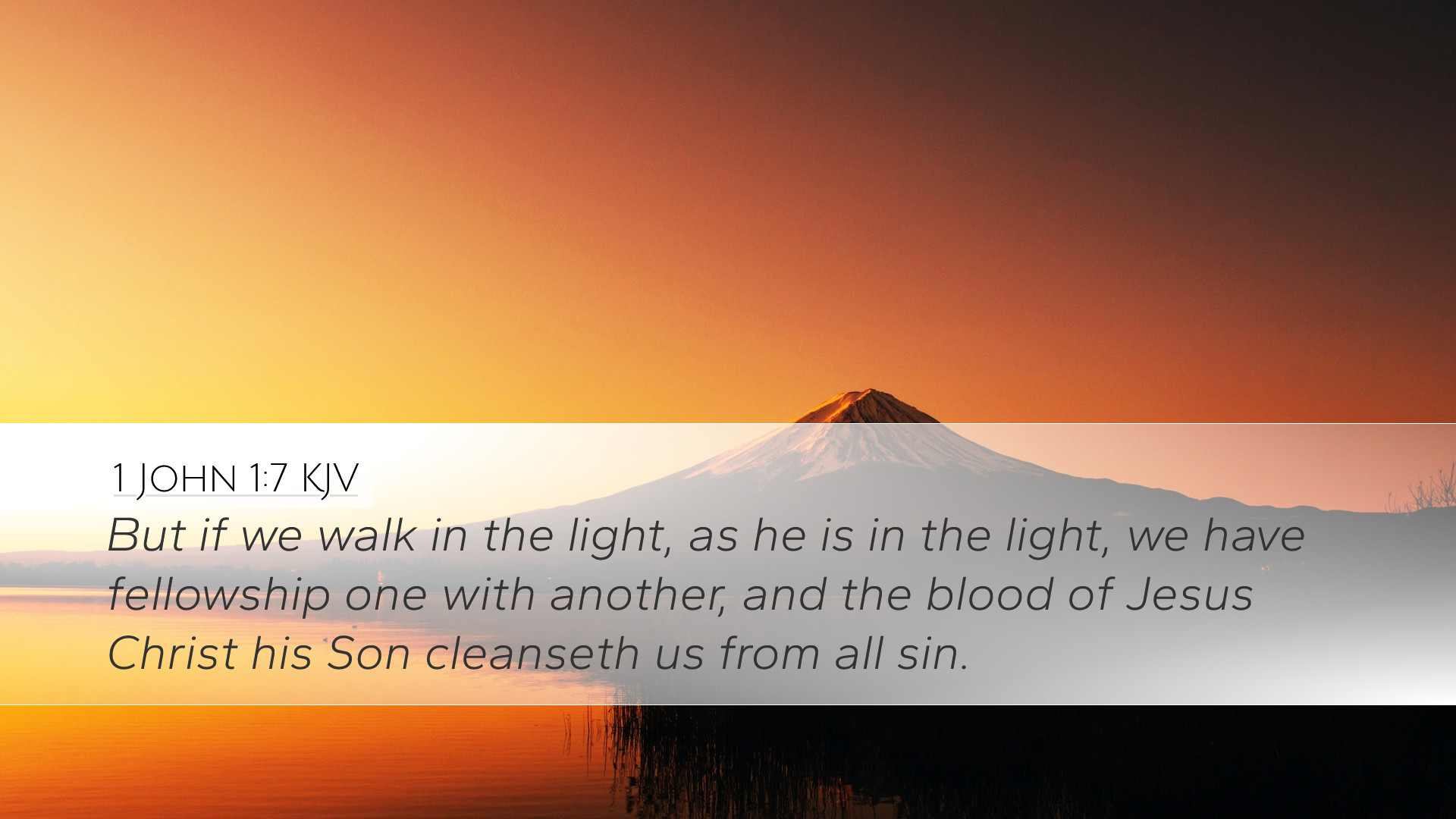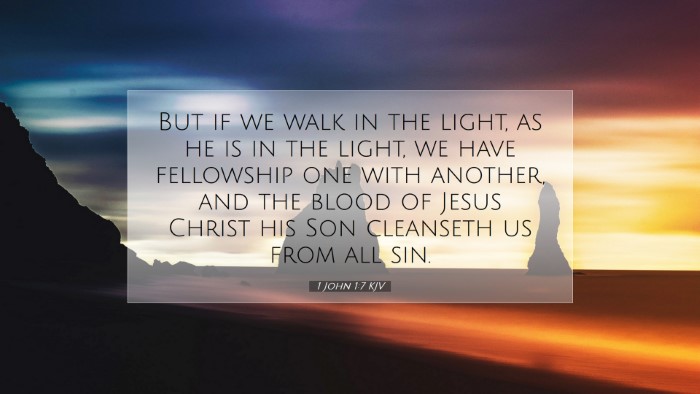Old Testament
Genesis Exodus Leviticus Numbers Deuteronomy Joshua Judges Ruth 1 Samuel 2 Samuel 1 Kings 2 Kings 1 Chronicles 2 Chronicles Ezra Nehemiah Esther Job Psalms Proverbs Ecclesiastes Song of Solomon Isaiah Jeremiah Lamentations Ezekiel Daniel Hosea Joel Amos Obadiah Jonah Micah Nahum Habakkuk Zephaniah Haggai Zechariah Malachi1 John 1:7
1 John 1:7 KJV
But if we walk in the light, as he is in the light, we have fellowship one with another, and the blood of Jesus Christ his Son cleanseth us from all sin.
1 John 1:7 Bible Commentary
Commentary on 1 John 1:7
Verse: 1 John 1:7 - "But if we walk in the light, as he is in the light, we have fellowship one with another, and the blood of Jesus Christ his Son cleanseth us from all sin."
Introduction
This verse is pivotal in the teachings of the Apostle John, emphasizing the importance of living in the light of Christ. It encapsulates fundamental Christian doctrines concerning fellowship, cleansing from sin, and the moral obligation to reflect the light of Christ in one's life.
Exegesis and Theological Insights
John employs the metaphor of "light" to describe the nature of God and the moral and spiritual condition expected of believers. This language is pervasive in scripture, often contrasting light and darkness.
- Walking in the Light:
To "walk in the light" signifies a lifestyle characterized by truth, holiness, and integrity. Matthew Henry points out that walking implies continuous action and progression, a daily journey in communion with God.
- Fellowship:
Walking in the light fosters genuine fellowship among believers. John Barnes emphasizes that mutual relationships thrive in the presence of holiness and truth. The Church, as the Body of Christ, is designed to function in unity and love.
- The Role of the Blood of Christ:
Adam Clarke states that the cleansing power of Christ's blood is a vital theme in this verse. It is through His sacrifice that believers stand justified and are cleansed from all sins. This cleansing is not merely a one-time act but an ongoing process facilitated by grace.
Commentary from Public Domain Sources
In the examination of 1 John 1:7, several noteworthy insights emerge from respected public domain commentaries.
Matthew Henry's Commentary
Henry articulates that true believers should strive to live in the light, which reveals their sins and clean them through the acknowledgment of Christ's redemptive work. He accentuates the assurance that fellowship with God is contingent upon living righteously.
Albert Barnes' Notes
Barnes highlights the implications of walking in the light, stating it manifests in behavior that reflects God's character. He argues that genuine faith necessitates a transformed life that bears testimony to the work and light of Christ.
Adam Clarke's Commentary
Clarke delves deep into the theological implications of the blood of Christ. He explains that this cleansing is comprehensive ("from all sin"), emphasizing that failure to acknowledge and walk in the light can lead to a lack of fellowship with God and other believers.
Practical Application for Today
For pastors, students, and theologians, understanding the depth of 1 John 1:7 encourages a living faith defined by the following principles:
- Continuous Self-Examination:
Believers are called to regularly assess their lives in the light of God's Word, fostering an environment for repentance and renewal.
- Building Community in Christ:
Healthy relationships within the Church are a reflection of walking in the light. A commitment to truth fosters deeper fellowship and discipleship.
- Proclaiming the Cleansing Power of Christ:
Pastors bear the responsibility to communicate the fullness of salvation, emphasizing that through Christ, believers experience not only forgiveness but ongoing cleansing from sin.
Conclusion
1 John 1:7 encapsulates a profound truth about the Christian experience: the necessity of walking in the light, the joy of fellowship, and the assurance of cleansing through Jesus' sacrifice. This verse remains a foundational scripture, guiding believers to live in accordance with God's nature and fostering unity within the Body of Christ.


